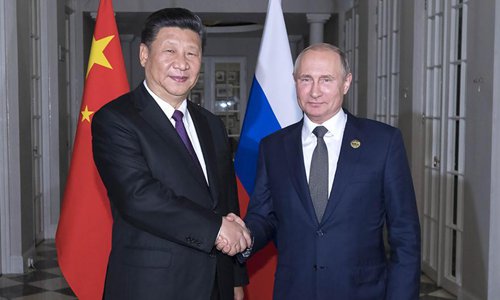HOME >> OPINION
China-Russia synergy drives regional stability and development
Source:Global Times Published: 2019/6/4 22:18:41

File photo: Xinhua
China-Russia relations are cordial in all respects. The comprehensive strategic partnership of coordination between the two countries runs deep and has made substantial progress in recent years. Chinese President Xi Jinping's visit to Russia will further consolidate the friendship between the neighbors.
By finding a proper way to get along, China and Russia have kept a stable and mature relationship, which has become a model for major countries. This year marks the 70th anniversary of diplomatic ties between the two nations. These relations go back to the times of the Soviet Union, the first country in the world to recognize the People's Republic of China after it was founded in 1949.
Over the past seven decades, the two sides have wound their way through confrontations, even bloody conflicts. Both countries have learned a lesson from history: Peace benefits both sides.
This is especially true today. Amid an overdose of hegemonism and unilateralism, stable and mature ties between Beijing and Moscow are strategically important to world peace, contemporary development, multilateralism and globalization.
Some disputes between China and Russia stemmed from ideological differences, others were about national interests, and yet some were caused by divergence in opinion or lack of communication.
However, both sides have stuck to a basic principle: cooperation on the basis of equality.
When disputes occurred, they sat across the table rather than pressuring each other to find a way out. In this way, tensions between Beijing and Moscow were eased and a healthy relationship was formed.
The way China and Russia treat each other is in sharp contrast with the methods of certain big powers fond of unilateralism and using hegemony to settle scores with other countries.
On May 29, Russian Deputy Prime Minister Maxim Akimov said at the fifth China-Russia Think Tank Forum in Moscow that based on current cooperation, China and Russia will further promote the integration of the Eurasian Economic Union (EAEU) within the framework of the China-proposed Belt and Road Initiative (BRI).
Some Russian scholars were once skeptical of the BRI, but they changed their mind after doing more research and China clarified their doubts. Through consultation and communication, Russia began to understand that the BRI is conducive to the development of China and Russia, and will also benefit the wider region surrounding the countries.
The heated discussion about the collaboration of EAEU with the BRI in recent editions of the St. Petersburg International Economic Forum was the result of Russia changing its approach, which has manifested itself in mature Beijing-Moscow relations.
Both China and Russia are developing. Russia is the largest country in the world in terms of land area, China is the most populated, and the two share a long border. They are complementary in terms of the economy and thus it is only natural for them to strengthen economic links. Take cooperation in the energy sector as an example. A stable supply of petroleum and natural gas is important for China's rapid growth, while Russia, by exporting energy resources, can earn foreign currency to boost development. The trade volume between China and Russia in 2018 reached $100 billion, the highest in history.
The political, diplomatic, economic and military cooperation between China and Russia are consistent with the long-term interests of their people and the world. Additionally, the two countries are stepping up people-to-people exchanges, thus further narrowing the cultural gap.
China-Russia relations and their cooperation mechanism are significant to both countries and regional stability and development. This new type of major country relations has been demonstrated under the framework of the BRI.
It is quite normal to have doubts and contradictions in global exchanges. Many problems can be properly dealt with through peaceful consultation and mutual understanding rather than suspicion and conflict.
The article was compiled by Global Times reporter Xu Hailin based on an interview with Yang Mian, a professor at the Institute of International Relations of the Communication University of China. xuhailin@globaltimes.com.cn
Posted in: VIEWPOINT